- Home
- James Rollins
Unrestricted Access: New and Classic Short Fiction Page 13
Unrestricted Access: New and Classic Short Fiction Read online
Page 13
ANFOG Gliders. Yep, those yellow research torpedoes are real . . . though I may have stretched their capabilities a bit. But not by much!
What’s Next?
At this story’s conclusion, Seichan makes a fateful decision to head to Hawaii, specifically Maui. Gray has, of course, cursed them by declaring nothing can go wrong. Their sabbatical from Sigma Force is about to come to a crashing end—and nothing will ever be the same for the two of them. Already forces are in motion, fueled by an ancient horror known only as The Demon Crown. So hold tight, and I hope you enjoy the wild ride to come!
Crash and Burn
A Sigma Force Short Story
James Rollins
April 17, 7:48 p.m.
Airborne over the North Atlantic
You’ve got to be kidding me.
A wolf whistle of appreciation drew Seichan’s attention across the plush cabin of the Gulfstream G150. The configuration of the private jet allowed for four passengers, but at the moment she shared this flight from D.C. to Marrakesh with only one other traveler, but his size and bulk filled most of the plane’s starboard side.
Joe Kowalski stood well over six feet, most of it muscles and scars. His legs stretched from one chair to the other, his boots propped on the leather seat. He cradled a long case open on his lap. He rubbed a finger along his lower lip, his craggy brows pinched in concentration as he studied the contents cushioned in the box. His other hand traced the contours of the snub-nosed shotgun resting there.
“Nice,” he muttered.
Seichan frowned at him. “How about not playing with a gun at thirty-five thousand feet.”
Talk about the wrong time, wrong place.
He scowled at her concern and picked up the weapon, turning it one way, then the other. “It’s not like it’s loaded.” He cracked the action open, exposing the double chambers—along with the two shells resting there. He quickly removed them and cleared his throat. “At least, not now.”
The case also held a belt of extra rounds. While the gun’s side-by-side double barrels looked like something out of the Old West, Seichan knew there was nothing old-fashioned about the weapon. The label stamped inside the case confirmed this:
Property of Homeland Security Advanced Research Project
The military prototype was called the Piezer. The stock of the weapon housed a powerful battery. Each 12-gauge shell—rather than being filled with buckshot or rock salt—was packed with piezoelectric crystals capable of holding an electric charge. Once powered up, the weapon would electrify the load, and with a pull of a trigger, the fired shell would explode in midair, blasting out a shower of shocking crystals, each carrying the voltage equivalent of a Taser. With no need to trail wires, the nonlethal weapon had a range of fifty yards, perfect for crowd control situations.
“I thought we agreed to keep your new toy locked up until we landed,” she said.
Per mission protocol, their weapons—including her sheathed daggers—were stored in a camouflaged crate, one engineered to withstand most scrutiny.
He shrugged sheepishly. Plainly he must have gotten bored and decided to break those rules, wanting something to play with during the long flight.
“Pack it back up,” she told him. “Crowe said you could field-test the weapon in your spare time, but he meant on the ground.”
And preferably well away from me.
They would be going their separate ways once they reached Morocco. She had been sent by Director Painter Crowe to investigate the black-market trafficking of stolen antiquities in Marrakesh. The funds financed various terrorist groups, and with her own past ties to such organizations, Seichan was perfectly suited to infiltrate and expose the operation.
Kowalski, on the other hand, was hitching a ride, about to begin an extended leave of absence from Sigma Force. Once they landed in Marrakesh, he would continue on to Germany, to visit his girlfriend in Leipzig, where the woman was working at a genetics lab.
Besides sharing this flight, Seichan and Kowalski also shared the dubious honor of being the black sheep of Sigma Force. The covert group was part of DARPA, the Defense Department’s research-and-development administration. Its members were former Special Forces soldiers who had been retrained in various scientific disciplines to act as field agents for DARPA, to protect US interests against various global threats.
She and Kowalski did not fit that mold.
Seichan was a former assassin, now employed off the books by Sigma. Kowalski had been a navy seaman who happened to be at the wrong place and wrong time, but who proved adept enough at blowing things up to serve as extra muscle and support for the group.
And while she and Kowalski shared this outsider status, the two could not be more different. He was all-American, loud and brash, rough around the edges, with a pronounced Bronx accent. She was Eurasian, svelte and nimble, trained for the shadows.
Still, despite their differences, she recognized a commonality. She had overheard him talking to his girlfriend, Maria, on the phone before their jet had lifted off. The relationship was new, untested, full of possibility. He smiled broadly when he talked, laughed with his entire body. In his voice, she heard the familiar undertones of longing and desire—some physical, some rising from deeper wellsprings.
Likewise, she had found someone, a man of remarkable ability and unfathomable depths of patience. He seemed to know when to draw close and when to pull back. It was a necessary skill to love someone like her. After decades in the shadows, to commit the acts she had done, she’d had to let that darkness inside.
Even now, she remained haunted, discovering her new life with Sigma was not all that different from her past. She still had to linger in the dark.
Not that I have any other choice.
After she’d betrayed her former employers, enemies now surrounded her on all sides. Her only refuge was within Sigma, but even there, she was a ghost, with only a handful of personnel aware of her presence or her past.
She turned to the window, to the sun sinking toward the ocean. Its brightness pained her, but she did not blink, trying to let that light deep inside her, to get it to chase away her black thoughts and dispel those shadows. But she knew better. It would be nightfall before much longer. Even the sun could not hold back the darkness forever.
The pilot called over the radio. “We’ll be touching down at Ponta Delgada in another fifteen minutes.”
Seichan stared below the wings, toward the archipelago of volcanic islands stretching ahead of them. The Azores were an autonomous region of Portugal. Their jet would be landing on São Miguel, the largest of the archipelago’s nine islands—but only long enough to refuel. The Gulfstream’s range was not far enough to make the transatlantic trip in a single hop.
As the plane began its descent, she studied the sweep of the Azores, noting the tiny silvery lakes glinting from the basins of green calderas. Most of the populace clustered in small towns or the main city of Ponta Delgada. The bulk of those islands remained untouched.
The pilot came back on. “Secure the cabin for final—”
His words ended with a loud screech from the radio. At the same time, Seichan’s body was set on fire. Blinded by pain, she gasped as her skin burned. Kowalski howled from across the cabin. As she breathed flames, the entire plane bobbled. The jet rolled into a nose dive. Still on fire, Seichan felt herself rise from her seat, restrained by her lap belt.
Then it all ended.
Her sight returned, and the searing pain in her skin dulled to the smolder of a sunburn. Kowalski sat in a shocked hunch, his large mitts clamped to his armrests.
What the hell . . .
Though the agony had ended, the jet continued to plummet. Seichan took a breath to collect herself and to see if the pilot regained control of the aircraft. When nothing happened, she snapped off her seat belt and fell toward the small cockpit. She forced the door open and hung from the threshold. Their pilot—a sixty-two-year-old air force veteran named Fitzgerald—slumped leadenly in
his chair, held up by his restraints, but clearly unconscious—if not dead.
She dropped into the empty copilot seat and switched controls to her side. She grabbed the yoke with both hands and pulled back hard. Past the windshield, blue ocean filled the world, rising quickly toward her. She fought to haul the nose up.
C’mon, c’mon . . .
As the front of the plane slowly lifted, the view shifted, showing a line of . . . then a fringe green forest . . . and finally the sheer flank of a volcano.
Though she had pulled out of the dive, their descent remained steep, their speed too fast. She had neither the time nor the clearance to sweep back into the air. A quick eye flick across the instrument panel—showing a plummeting altimeter and a map of a doomed glide path—confirmed her grim assessment.
We’re going down.
Knowing this, she cut the throttle.
She hollered to Kowalski. “Crash position! Now!”
One-handed, she pulled her own restraints over her shoulders and snapped her belt in place. As the jet raced for the water, she continued to hold the yoke to her belly. She trimmed the flaps, struggling to keep the aircraft’s wings even.
Still, at the end, she had to abandon the high-tech instruments and go by the seat of her pants. She stared out the window, eyeballing the ocean rushing toward her, noting the curved line of a beach ahead. Beyond it, a stretch of forest lined the base of a towering wall of black cliffs. But between the beach and the forested cliffs, a large resort shone in the last rays of the sun. Its dozen stories of white walls and windows glowed brightly, like the pearly gates of some tropical heaven.
And we’re about to go crashing into them.
To avoid such a fiery end, Seichan had to attempt a hard water landing. As the ocean swept up, she waited until the last moment and timed her move as best she could. Just before they struck the water, she dropped the flaps and hit the throttle hard. Goosed by the sudden power, the plane flared up, nose lifting. The tail end hit the waves first. On that signal, she cut the engines. The rest of aircraft belly-slammed into the water.
Thrown forward into her restraints, she could do nothing more as the jet’s momentum sent the craft skipping and spinning across the water like a flat stone. The tip of a wing struck a wave, sending the jet cartwheeling the last thirty yards, until it finally ground into sand, coming to a stop in the shallows.
She sagged in her own restraints, breathing hard, trying to force her heart out of her throat.
“Still in one piece back here!” Kowalski called from the cabin. “Not so sure about the plane.”
Of course, Kowalski was okay. The man had too few marbles to be truly rattled by anything.
“Help me with Fitzgerald,” she ordered.
The pilot remained unconscious, but at least he appeared to be breathing. She unbuckled herself, then freed Fitzgerald, catching his weight as he fell forward.
Kowalski joined her and grabbed the pilot under his arms and hauled his prone body out of the cockpit. “What happened to him?”
“We’ll figure it out later.” She remembered the blast of fiery pain, but she had no clue as to its source or what it meant.
One problem at a time.
Seichan wiggled past the pair and shouldered the cabin door open. A breeze blew in, bringing the scent of salt water, along with the smell of burning oil. A glance forward showed smoke rising from the crumpled engine cowling. Though they had been flying on a nearly empty fuel tank, the risk of an explosion remained.
She hopped into the thigh-deep water, soaking her boots and jeans. She hiked her jacket higher to keep it dry as waves washed over her legs.
She pointed to the beach. “Hurry!”
Kowalski jumped out, not bothering to keep his knee-length leather duster dry. He hauled Fitzgerald by his armpits and dragged the pilot behind him.
The group waded stiffly away from the side of the plane and climbed out onto the dry sand. By now, the sun had sunk into the ocean, leaving the skies aglow behind them, but ahead, the dark volcanic peak loomed, framed by the first sweep of stars.
She guessed they had crashed into one of the outer islands of the Azores.
But where exactly?
She stared down the beach. A hundred yards away, the resort she had spotted from the air appeared to be the only habitation. It rose from a dense forest of palms and dark trees. Flickering torches illuminated the hotel’s many terraces. The faint strains of music wafted over to them.
Seichan knew any help lay in that direction, but she remained on edge since the crash. Something’s not right here.
Even Kowalski acknowledged this. “How come no one’s running over here to check on us?”
A groan drew their attention to the sand. The pilot was finally stirring, shivering from being dragged through the cold water.
Kowalski dropped to a knee, helping Fitzgerald sit up. “Hey, man, you’re okay.”
But the man wasn’t.
His eyes snapped toward Kowalski, the groan turning into a low growl. Shocked, Kowalski leaned away. Fitzgerald’s face contorted into a mask of rage, and he shoved Kowalski back, forcefully enough to knock the large man on his rear. The pilot leaped to his feet, but he remained leaning on the knuckles of one hand.
Fitzgerald’s eyes swung between the two of them, his lips snarling, baring his teeth.
Then without warning, he leaped toward Seichan, likely going for the smaller target. Seichan caught him and used his momentum to toss his weight over her hip. Or that was the plan. He hooked an arm around her waist, moving far faster than she expected from a sixty-year-old. Trapped together, they both fell hard to the sand. She landed on her back and twisted her head to the side as he snapped at her face, coming close to taking off her ear.
They grappled for several long breaths, rolling across the sand. She fought to break free, but the man’s muscles were iron hard, his reflexes cunning. She finally got her legs bunched under her and kicked him in the stomach, hard enough to finally break his hold and send him flying back.
Before she could even regain her feet, Fitzgerald landed in a crouch, skidding in the sand but staying impossibly upright. He lunged again for her.
But a blast sounded behind her. A scintillating blue cascade shot over her head and struck the pilot in the chest. A few shards of the brilliance shattered past his form and danced over the dark sand.
Fitzgerald sprawled across the beach, his limbs jerking and twitching. His wet clothes ran with fiery spiderwebs of electricity. As the dazzling effect faded, his body went slack and limp, out cold again.
Seichan looked back to see Kowalski standing with his new toy at his shoulder. One muzzle of the Piezer’s double barrels still glowed softly from the discharged energy. Clearly, the man had refused to abandon the weapon and hidden it under his duster. The gun’s ammunition belt was already hooked around his waist.
Thank god for the man’s love of his toys.
Kowalski lowered his shotgun, eyeing it appreciatively. “Guess it works.”
She glanced down at the unconscious pilot.
It certainly does.
She studied the smoking jet, wondering if she should risk going for her own weapons.
“Company’s coming,” Kowalski said, drawing her attention down the beach.
Past the resort property, a pair of headlamps had blinked on and shone brightly along the dark curve of sand. The rumble of an engine echoed over the water, as a large truck started in their direction.
“Looks like someone’s finally checking for survivors,” Kowalski said.
After all this strangeness, she suspected the opposite was more likely true. She pointed to Fitzgerald. “Drag him into the forest.”
“Why are we—?”
“Just do it. Now!”
As Kowalski obeyed, she rushed over and grabbed a dry palm frond. She did her best to erase their path into the woods, or at least obscure the number of footprints. Once under the bower, she tossed her makeshift broom aside.
“Then what are we going to do?”
She stared through the trees toward the flickering torches. “Let’s go inquire about a late check-in.”
8:38 p.m.
Hidden behind a fragrant hedgerow of blue-flowering hydrangeas, Seichan studied the shadowy grounds behind the resort. Nothing stirred across the acres of manicured lawns, and garden paths. The only noise came from a few small fountains burbling from decorative ponds. Higher up, a group of candlelit tables illuminated a second-story dining terrace, all deserted.
Definitely something wrong here.
Closer now, she could tell the resort property was a new construction. It still showed signs of ongoing work: scaffolding along one side, tilled but unplanted garden beds, rows of sapling trees waiting in buckets.
Still, from the faint strains of music and the flaming torches, it was clear the place was open for business, even if it was only a soft opening to test staff and facilities.
Beside her, Kowalski swatted as something dark swept past his cheek. “What’s with all these friggin’ bats?”
She had noted the same while crossing through the woods. Scores of leathery wings had flitted among the branches, accompanied by an ultrasonic chorus that set her teeth on edge. Across the grounds, smoky clouds of bats swirled in bands, rising low and sweeping high. More and more seemed to be flowing down from the dark flank of the volcano behind them, rising out of caves and rocky roosts to hunt the night.
But the bats weren’t her true concern at the moment.
She glanced to her left. Off by the beach, lights glowed through the trees, marking the location of the truck and whoever had been drawn to the crashed jet. Occasional louder voices reached them, the words too muffled to make out clearly. She knew searchers were probably already combing the woods after finding the aircraft empty. She and Kowalski needed to get under cover quickly, and the hotel offered them a multitude of hiding places.

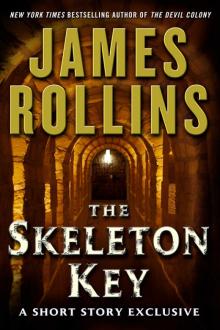 The Skeleton Key
The Skeleton Key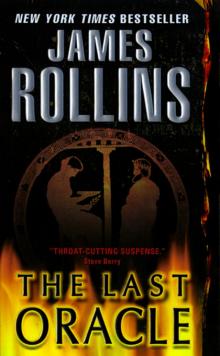 The Last Oracle
The Last Oracle The Judas Strain
The Judas Strain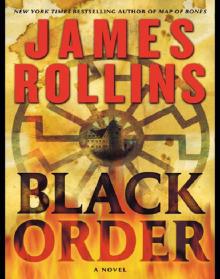 Black Order
Black Order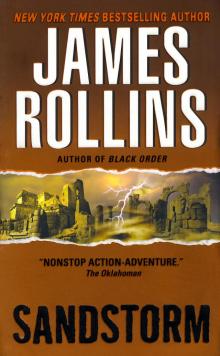 Sandstorm
Sandstorm Ghost Ship
Ghost Ship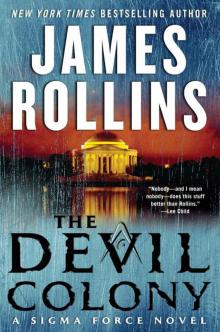 The Devil Colony
The Devil Colony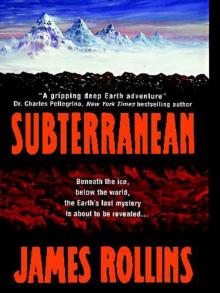 Subterranean
Subterranean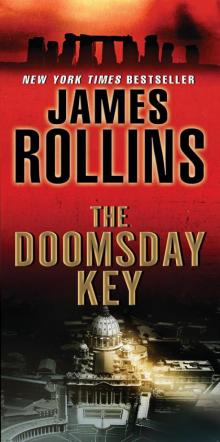 The Doomsday Key
The Doomsday Key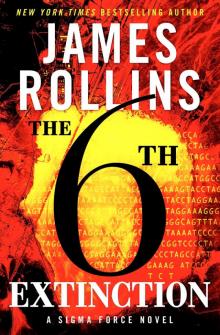 The 6th Extinction
The 6th Extinction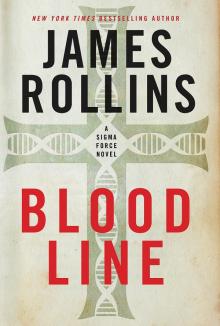 Bloodline
Bloodline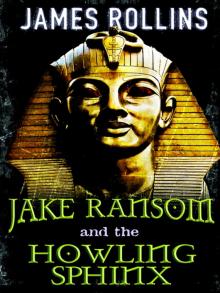 Jake Ransom and the Howling Sphinx
Jake Ransom and the Howling Sphinx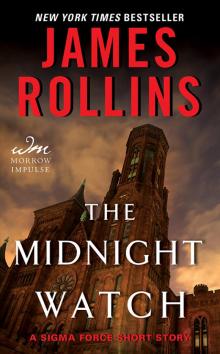 The Midnight Watch
The Midnight Watch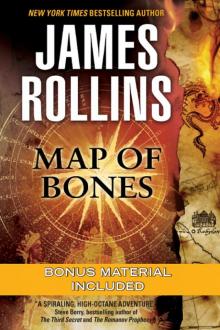 Map of Bones
Map of Bones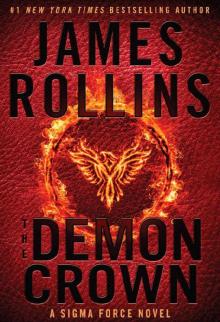 The Demon Crown
The Demon Crown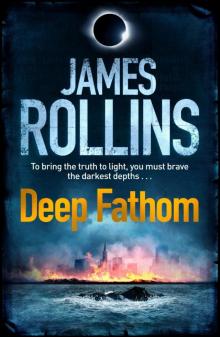 Deep Fathom
Deep Fathom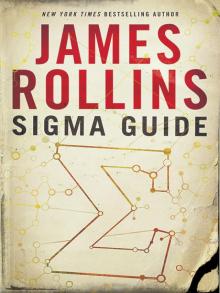 Sigma Guide
Sigma Guide Kowalski's in Love
Kowalski's in Love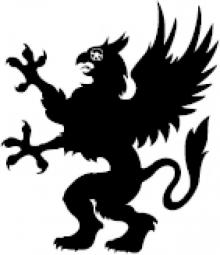 Jake Ransom and the Skull King's Shadow
Jake Ransom and the Skull King's Shadow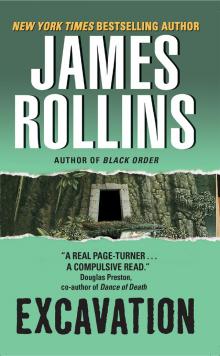 Excavation
Excavation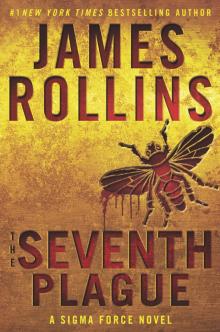 The Seventh Plague
The Seventh Plague Altar of Eden
Altar of Eden Unrestricted Access: New and Classic Short Fiction
Unrestricted Access: New and Classic Short Fiction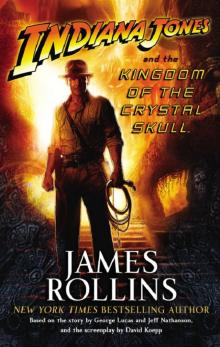 Indiana Jones and the Kingdom of the Crystal Skull
Indiana Jones and the Kingdom of the Crystal Skull Crucible
Crucible The Eye of God
The Eye of God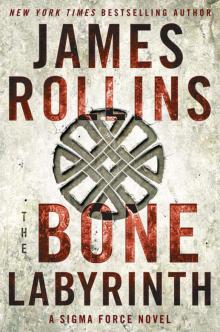 The Bone Labyrinth
The Bone Labyrinth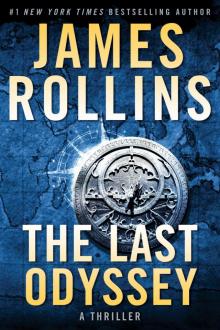 The Last Odyssey: A Thriller
The Last Odyssey: A Thriller Unrestricted Access
Unrestricted Access Amazonia
Amazonia Blood Brothers: A Short Story Exclusive
Blood Brothers: A Short Story Exclusive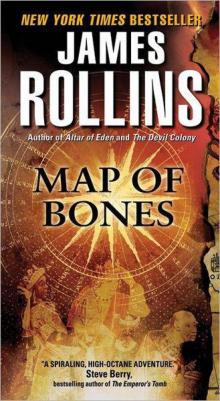 Map of Bones: A Sigma Force Novel
Map of Bones: A Sigma Force Novel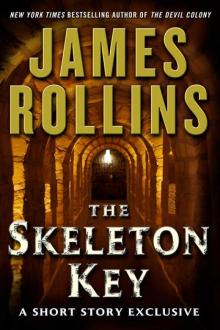 The Skeleton Key (sigma force)
The Skeleton Key (sigma force)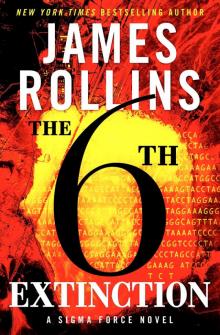 Sigma Force 10 - The Sixth Extinction
Sigma Force 10 - The Sixth Extinction Innocent Blood
Innocent Blood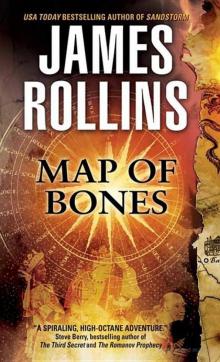 Map of Bones sf-2
Map of Bones sf-2 The Eye of God: A Sigma Force Novel
The Eye of God: A Sigma Force Novel The Eye of God: A Sigma Force Novel sf-9
The Eye of God: A Sigma Force Novel sf-9 The Pit
The Pit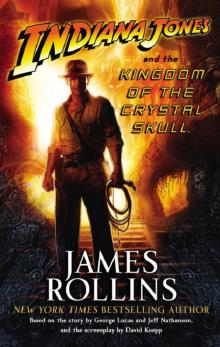 Indiana Jones and the The Kingdom Of The Crystal Skull
Indiana Jones and the The Kingdom Of The Crystal Skull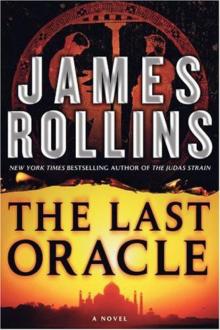 The Last Oracle (2008) sf-5
The Last Oracle (2008) sf-5 City of Screams
City of Screams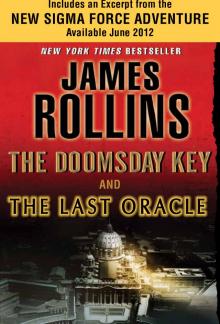 The Doomsday Key and The Last Oracle with Bonus Excerpts
The Doomsday Key and The Last Oracle with Bonus Excerpts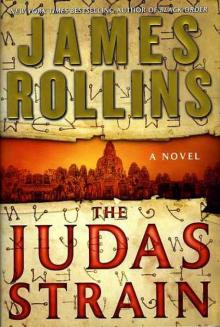 The Judas Strain sf-4
The Judas Strain sf-4 Blood Infernal
Blood Infernal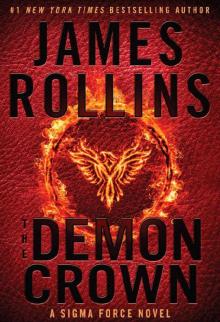 The Demon Crown: A Sigma Force Novel
The Demon Crown: A Sigma Force Novel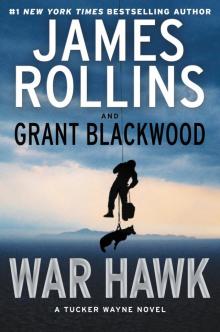 War Hawk: A Tucker Wayne Novel
War Hawk: A Tucker Wayne Novel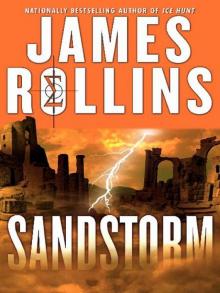 SANDSTORM sf-1
SANDSTORM sf-1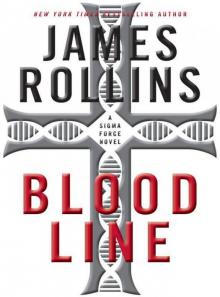 Bloodline: A Sigma Force Novel
Bloodline: A Sigma Force Novel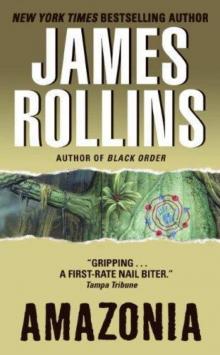 Amazonia: a novel
Amazonia: a novel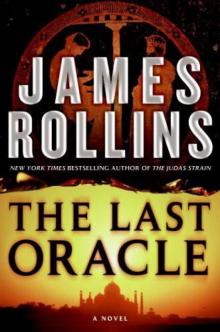 The Last Oracle: A Sigma Force Novel
The Last Oracle: A Sigma Force Novel City of Screams (the order of the sanguines)
City of Screams (the order of the sanguines)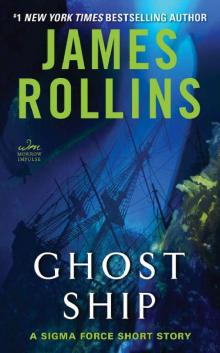 Ghost Ship: A Sigma Force Short Story
Ghost Ship: A Sigma Force Short Story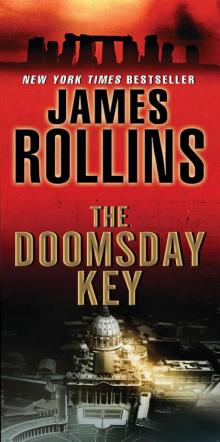 The Doomsday Key: A Sigma Force Novel
The Doomsday Key: A Sigma Force Novel